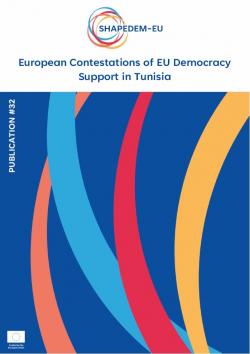European Contestations of EU Democracy Support in Tunisia

This paper investigates the narratives of contestation of the European Union’s democracy support practices in Tunisia, focusing on perspectives from both insiders and outsiders within the EU. The study covers thirteen motions for resolution in the European Parliament, six parliamentary debates, and more than forty articles and op-eds produced by human rights organizations, news outlets and think tanks. The timeframe spans from 2021, following Kais Saïed’s power grab, to 2023, in the aftermath of the EU–Tunisia Memorandum of Understanding (MoU). The paper relies on qualitative discourse analysis and identifies two distinct narrative frameworks. The first, labelled as incremental narrative of contestation, calls for a refinement and intensification of EU democracy support to halt further democratic backsliding. The second frames the EU itself as partly responsible for Tunisia’s democratic regression, criticising its policies for failing to deliver the expected positive impact on the country’s democratic standards. The findings show that while progressive contestations have shifted from framing Saïed as the primary “villain” to increasingly holding the EU accountable, it is pragmatic narratives that prevail in EU decision-making spaces and shape external action. The EU’s stance has shifted decisively toward pragmatism, prioritising security imperatives and regime stability over democracy promotion – a trend epitomised by the MoU. Rather than triggering a reassessment of democracy support, this period reinforced the perception of democracy promotion as ineffective in advancing EU strategic goals, which are now pursued through realpolitik-oriented engagement. This recalibration, driven by conservative forces and reinforced by member-state leadership, has marginalised civil society voices, raising fundamental questions about the actual influence of contestation in shaping EU external governance.
-
Dati bibliografici
SHAPEDEM-EU Publications, No. 32 (July 2025), 13 p.
Introduction
1 Framing the Democratic Backsliding in Tunisia
2 The Incremental Narrative
2.1 Empowering Civil Society
2.2 Pragmatic Narrative
3 Tunisia Backsliding with EU Complicity?
Conclusions
Bibliography



